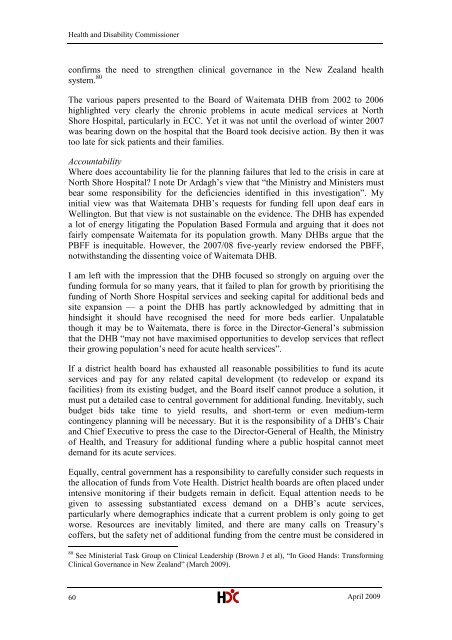North Shore Hospital report - New Zealand Doctor
North Shore Hospital report - New Zealand Doctor
North Shore Hospital report - New Zealand Doctor
You also want an ePaper? Increase the reach of your titles
YUMPU automatically turns print PDFs into web optimized ePapers that Google loves.
Health and Disability Commissionerconfirms the need to strengthen clinical governance in the <strong>New</strong> <strong>Zealand</strong> healthsystem. 80The various papers presented to the Board of Waitemata DHB from 2002 to 2006highlighted very clearly the chronic problems in acute medical services at <strong>North</strong><strong>Shore</strong> <strong>Hospital</strong>, particularly in ECC. Yet it was not until the overload of winter 2007was bearing down on the hospital that the Board took decisive action. By then it wastoo late for sick patients and their families.AccountabilityWhere does accountability lie for the planning failures that led to the crisis in care at<strong>North</strong> <strong>Shore</strong> <strong>Hospital</strong>? I note Dr Ardagh‘s view that ―the Ministry and Ministers mustbear some responsibility for the deficiencies identified in this investigation‖. Myinitial view was that Waitemata DHB‘s requests for funding fell upon deaf ears inWellington. But that view is not sustainable on the evidence. The DHB has expendeda lot of energy litigating the Population Based Formula and arguing that it does notfairly compensate Waitemata for its population growth. Many DHBs argue that thePBFF is inequitable. However, the 2007/08 five-yearly review endorsed the PBFF,notwithstanding the dissenting voice of Waitemata DHB.I am left with the impression that the DHB focused so strongly on arguing over thefunding formula for so many years, that it failed to plan for growth by prioritising thefunding of <strong>North</strong> <strong>Shore</strong> <strong>Hospital</strong> services and seeking capital for additional beds andsite expansion — a point the DHB has partly acknowledged by admitting that inhindsight it should have recognised the need for more beds earlier. Unpalatablethough it may be to Waitemata, there is force in the Director-General‘s submissionthat the DHB ―may not have maximised opportunities to develop services that reflecttheir growing population‘s need for acute health services‖.If a district health board has exhausted all reasonable possibilities to fund its acuteservices and pay for any related capital development (to redevelop or expand itsfacilities) from its existing budget, and the Board itself cannot produce a solution, itmust put a detailed case to central government for additional funding. Inevitably, suchbudget bids take time to yield results, and short-term or even medium-termcontingency planning will be necessary. But it is the responsibility of a DHB‘s Chairand Chief Executive to press the case to the Director-General of Health, the Ministryof Health, and Treasury for additional funding where a public hospital cannot meetdemand for its acute services.Equally, central government has a responsibility to carefully consider such requests inthe allocation of funds from Vote Health. District health boards are often placed underintensive monitoring if their budgets remain in deficit. Equal attention needs to begiven to assessing substantiated excess demand on a DHB‘s acute services,particularly where demographics indicate that a current problem is only going to getworse. Resources are inevitably limited, and there are many calls on Treasury‘scoffers, but the safety net of additional funding from the centre must be considered in80 See Ministerial Task Group on Clinical Leadership (Brown J et al), ―In Good Hands: TransformingClinical Governance in <strong>New</strong> <strong>Zealand</strong>‖ (March 2009).60April 2009
















